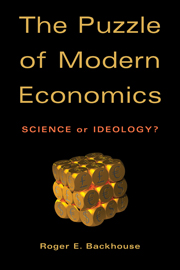Book contents
7 - The Quest for Rigorous Macroeconomics
Published online by Cambridge University Press: 05 June 2012
Summary
FROM THE GENERAL THEORY TO MACRO-ECONOMETRIC MODELLING
How did economics come to be dominated by theories that, in the opinion of a significant number of economists, either led to serious policy errors, or, at best, distracted economists from the issues that needed to be addressed? This chapter leaves aside the possible role played by ideology (discussed in Chapter 8) and explores the extent to which the desire to develop a rigorous, ‘scientific’ macroeconomics was a major factor behind the subject evolving in the way that it did.
The turning point in twentieth-century discussions of what is now called ‘macroeconomics’, or the study of economy as a whole, including the problems of money, inflation, unemployment, economic growth and the business cycle, was undoubtedly the publication of The General Theory of Employment, Interest and Money (1936) by the Cambridge economist, John Maynard Keynes. Keynes did not invent macroeconomics – theorizing on such topics has a very long history, and neither did Keynes invent the term – but the General Theory was the main route through which ideas developed in the interwar period entered modern economics. His book provided the framework on which macroeconomics was rapidly reconstructed during and after the 1940s.
The need to reconstruct the subject grew in part out of the move towards formal modelling. The General Theory provided a set of components out of which economists could construct formal, mathematical models that could be used to analyse the effects of policy changes on variables such as the level of economic activity and the unemployment rate.
- Type
- Chapter
- Information
- The Puzzle of Modern EconomicsScience or Ideology?, pp. 117 - 136Publisher: Cambridge University PressPrint publication year: 2010



